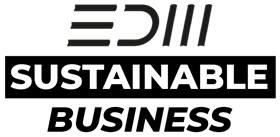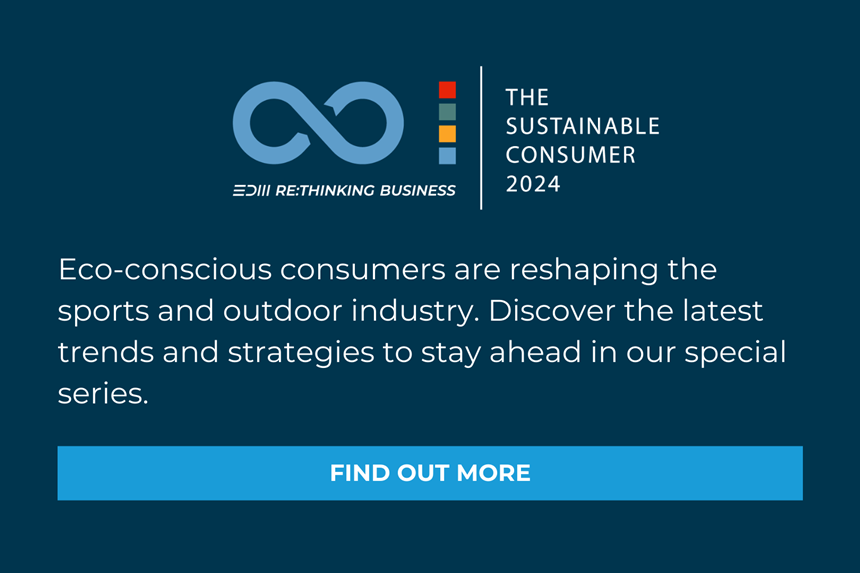The latest NXT Sustainable Consumer Report 2022, conducted by Swedish market analyst Fredrik Ekström from Above the Clouds, aims to cut through the fog of uncertainty around sustainability and reveal a journey we’re on, as consumers and brands. In his contribution to the EDM Sustainable Business Special, he explains the increasing social status that is attached to sustainable behavior in certain peer groups and the necessary conclusions.
To successfully transform a brand from linear to circular and into having a sustainable mindset, we must rethink our approach to products, storytelling, cultural status, and consumers. Sustainability transformations often seem simple, logical, and inevitable when presented and cited in the press. But few transformative attempts are straightforward, and in the uncommon event that they do succeed as planned, they usually take years to yield significant results. During the process, it is crucial to engage the consumers to keep them from migrating to other brands that have a more compelling story or yield higher cultural status.
A successful sustainability brand transformation does not happen with a single campaign. There are no shortcuts. There is only a roadmap of strategic, creative, and operational decisions that, if executed consistently, puts a brand on the path to sustainability, cultural status, consumer excitement, and business success.
Different shades of green - Sustainability Zombies, Eco Swingers and Anxious Doers
Sustainability as a trusted one-size-fits-all solution, where the word has universal meaning and is decoded in the same way regardless of the consumer, has long been co-opted. The latest NXT Consumer Sustainability survey tells a different story. For the Swedish consumer, the meaning of sustainability is becoming more detailed: A fact that also affects their relationships with brands and communications.
To better understand why and how consumers do (or do not) incorporate sustainability issues into their consumption pattern, what influences them, and what messaging triggers, Above the Clouds has created the “Sustainable Consumer Readiness Curve.” This is a tool that Above The Clouds use to divide the Swedish audience into different consumer types depending on how ready they are to adopt a sustainable lifestyle and is also estimating their share: Sustainability Zombies (7%), Spectators (13%), Eco-Swingers (37%), Anxious Activists (36%) and Dedicated Pioneers (7%). The consultants found a shift towards making more environmentally friendly, sustainable, or ethical purchases in the wake of the Covid-19 crisis and saw a green leap in consumer behavior.
This green movement means that eight out of ten consumers describe themselves as someone for whom sustainability is part of their self-image and who provides positive impetus for sustainability initiatives in various ways.
Sustainability and Status Anxiety
However, during the crisis, consumers have faced an overload of sustainability interest and communication from brands, creating a world where the meaning of the word “sustainability” has been co-opted, and greenwashing brands still operate unchecked. In short, the term sustainability has lost a bit of its glory purpose while the consumer feels anxious. And this anxiety is not just about the well-being of the planet. The increased social interest in the topic creates a new form of cultural sustainability status symbols where knowledge about the environment gives higher status and impresses peers. Making the wrong choices creates a risk of losing cultural status and creates a form of sustainability status anxiety, especially among Gen-Z and the dedicated consumer profiles.
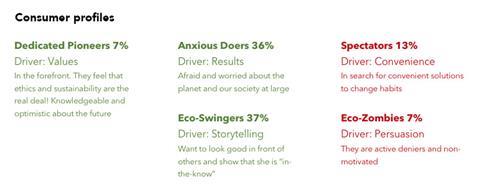
The word “status” affects people; it makes us feel a little embarrassed and usually nothing we want to talk about. At the same time, one cannot help but be fascinated by the power behind it. So what is it about status when eight out of ten Swedish consumers describe themselves as associating their self-image with sustainability? And why is that so important for brands?
There is a careless, casual use of the word “status” where expensive items are usually the way to obtain the same, and consequently status would only be about surface and financial success. But nothing could be more wrong, especially with Gen-Z, where 80 percent say they are impressed by a person who teaches them something new and exciting about sustainability, and 20 percent are physically attracted to a person living a seemingly sustainable and healthy life.
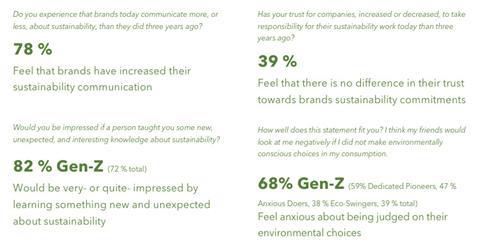
The desire to learn more about sustainability is turning knowledge about sustainability into a new cultural status symbol. But with these new patterns and the rapid transformation of sustainability in society also comes a new insecurity. Seven out of ten Gen-Z consumers believe their friends will look down on them negatively if they don’t make environmentally conscious choices regarding their consumption, while nearly nine out of ten Gen-Z believe their environmental decisions won’t have a major impact - neither for the better nor for the worse.
The paradox of being impressed with knowledge while feeling like you have no control over your actions can be devastating for consumers, and probably never before have brands had so much opportunity and responsibility to act as sustainability role models to alleviate this anxiety.
The fear of making the wrong choices, combined with the feeling of being impressed and attracted to those with sustainability knowledge, can create a worry so destructive that we find ourselves at risk of not living up to the ideals of success set by our peers and society, and potentially losing our status as a result. This can ultimately be both a driver and a barrier for consumers to transition to a more sustainable lifestyle.
Consumers will ultimately demand more than just information about the environmental benefits of products and brands in order to shift to a sustainable lifestyle. They also need help building their self-image with values, results and stories as they make their sustainable transformation. They want bragging rights and proof that they are doing the right thing and not being judged by their peers.
The NXT Sustainable Consumer Report 2022
The report is based on quantitative and qualitative research from Above The Clouds’ Future Series about the NXT Sustainable Consumer in Sweden. It provides tools to thrive in a time of transition, outlining areas where the consumers’ hearts and anxieties are right now, strategies for success, three consumer profiles you need to be talking to, and how to speak with them.
Above The Clouds guides you through this shifting landscape by providing expert consumer insight and actionable advice as a change forecaster. With the report, you will find tools and insights to power up your 2022 brand strategies through sustainability and eco-decisions.
What to expect in The NXT Sustainable Consumer Report 2022:
1. Insights: The sustainable consumer readiness curve
2. Drivers: Sustainability, status and anxiety
3. Future: Gen-Z, the eco-sexual generation?
4. Future: Brand activism is here to stay
5. Opportunities: My sustainability dream brand
6. Opportunities: Deep dive, three consumer profile
Facts about the report:
Step 1: 2020 - Qualitative Research, desktop and expert interviews. Published in Scandinavian MIND – The New Sustainable Consumer and her search for truth.
Step 2: 2021 - Quantitative Research
1,064 respondents, representing the general population in Sweden.
Data gathering via web-panel, Oct. 25 - Nov. 2, 2021.
Head of insights: Fredrik Ekström, founder of Above The Clouds, www.abovetheclouds.se
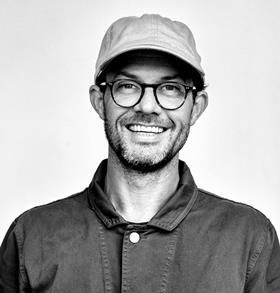
About the author:
Fredrik Ekström is a Senior Business Advisor and brand communication consultant with over 17 years of experience working with brand activations, insights and development. He specializes in sustainable lifestyle brands and transforming research and insights into creative actions that breathe new life into brand purpose and craft brands that stand for something, engage people and ultimately stand out from the competition.
Back to EDM Sustainable Business landing page.
